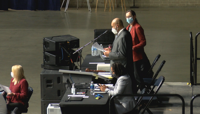SPRINGFIELD, Ill. �� The Illinois House and Senate held committee hearings Saturday specifically addressing the monumental Black Caucus vision to transform the state’s criminal justice system.
The House Judicial-Criminal Committee met for nearly three hours highlighting portions of the . Republican members questioned the bill’s sponsor, Rep. Justin Slaughter (D-Chicago), about several additions to the 611-page proposal.
“Can you just give us some idea of when the general public might see it as a part of the bill and when they might be able to weigh in on it as a part of this bill,�� asked Rep. Terri Bryant (R-Murphysboro).
One of the new provisions would eliminate mandatory minimum sentences. Another could reduce penalties for drug possession from a felony to a Class A misdemeanor. Advocates feel Illinois should stop relying on the criminal justice system as a “dumping ground�� for people struggling with addiction. However, Bryant and Rep. Patrick Windhorst (R-Metropolis) argued against lowering penalties for possessing any drug. Committee Vice-Chair Kelly Cassidy (D-Chicago) brought the debate to a halt.
“We have a problem with these arrests and people being held in county jails, sometimes for longer than their ultimate sentence ends up being. That’s not getting folks into treatment,�� said Rep. Kelly Cassidy (D-Chicago). “That is keeping folks on the treadmill of addiction.��
Pretrial fairness
Committee members also heard testimony on one of the most controversial portions of the proposal which could eliminate cash bail. Thousands of advocates in Illinois have supported the Pretrial Fairness Act and feel this would be a great step forward for justice.
“We have a much larger group of individuals who remain in jail not because they are too dangerous to be released or ineligible to be released, but because they don’t have access to money,�� explained Sharone Mitchell, Director of the Illinois Justice Project.
Mitchell says the current system is neither just nor safe.
The Senate Executive Committee met in the Capitol, several blocks away from their colleagues in the Bank of Springfield Center. Several of the same advocates spoke before the Senators. Meanwhile, the Illinois Municipal League noted support for some portions of the proposal. However, the organization opposes prison gerrymandering, ending qualified immunity for police, and abrupt changes to body camera mandates.
“It’s the law on unintended consequences that could be most expanded with this bill and with such short opportunity to develop our final thoughts,�� said IML Executive Director Brad Cole.
The Illinois Fraternal Order of Police Labor Council also found issue with the qualified immunity provision. General Counsel Tamara Cummings argued that alone would open the floodgates for lawsuits.
“Retention of good officers is at an all-time low,�� Cummings said. “Not only will it be a deterrent to current officers, I suspect it would deter future prospects from entering the police force.��
Support from Cook County
Cook County State’s Attorney Kim Foxx reaffirmed her support for House Bill 163 on Saturday despite concerns from conservatives. Foxx believes the proposal will help build trust with police and address discriminatory criminal justice policies.
“Although not perfect, with thoughtful deliberation and collaboration House Bill 163 can be worked to address concerns, which is why I support this critical piece of criminal justice reform legislation,�� Fox stated.
House Minority Leader Jim Durkin quickly hit back following the message from Chicago. The Western Springs Republican said Foxx showed her intentions by leaving victims, neighborhoods, and law enforcement behind.
“As a former Assistant State’s Attorney in Cook County, I believe her support of House Bill 163 may be the most disappointing and irreconcilable breach of trust between State’s Attorney Foxx and the citizens of Cook County. Every elected State’s Attorney throughout Illinois strongly opposes House Bill 163 except State’s Attorney Foxx,�� Durkin stated. “These anti-victim and anti-law enforcement proposals have no place in our society. Ms. Foxx should change the name on her door to Office of the Public Defender.��














